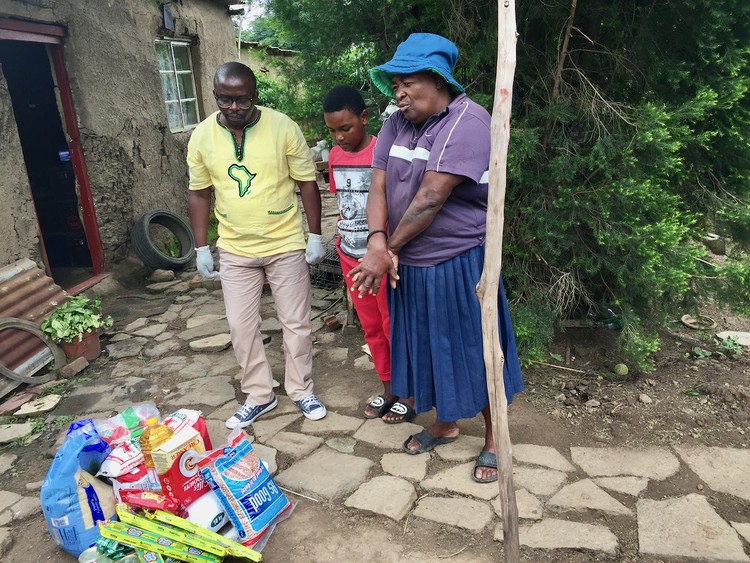
Street hawker Lindiwe Ngubane and Sbongakonke Ngubane receive a grocery donation at her home from Sibongumusa Zuma. Photo: Nompendulo Ngubane
3 April 2020
Across the country street hawkers have been prohibited from trading during the national lockdown to slow the spread of Covid-19.
“It is hard for everyone but for them it’s harder,” says Sibongumusa Zuma. He organised youths to donate groceries to ten street vendors in Dambuza, Pietermaritzburg, with assistance from local businesses.
“We are living with them and we see them hustling every day,” said Zuma. “After the President’s announcement we sat down and discussed how we can assist them. We decided that we can buy them food. It’s not enough, but it will make a difference.”
“They are not registered and they will not be compensated by the government. Their businesses are not operating … At the moment they are not getting money. They are forced to stay at home and their families have to eat,”said Zuma.
Some of the street hawkers sell sweets outside schools, some braaied mealies in town, others are recyclers.
For nine years, Lindiwe Ngubane used to collect empty cans and sell them to scrapyards. She lives with her daughter and grandson. “I don’t know what to say but God is great. It’s only Day Six of the lockdown, but I was feeling the pinch. My mealie meal was finished … We were even afraid to go out because we had no soap to use to wash our hands,” said Ngubane.
“If I don’t go out and work that means going to bed hungry. I now have food. God has made a plan for us. I am grateful to Zuma and his team for thinking about us through this challenging time,” she said.
Thembile Zondi, who lives with her family of 19, sold mealies in Church Street, Pietermaritzburg. Receiving the groceries, Zondi ululated and then said, “I don’t want to lie … I thought of waking up and going to work. Some of my colleagues warned me about the soldiers. I wanted to go because there was no food in the house. That was the stress. I was depressed. All of my family depends on me.
“Now, I don’t have to worry about food. Thank you to all of you, my children. I’m over the moon. I have no words to describe my gratitude for what you have done for me.”